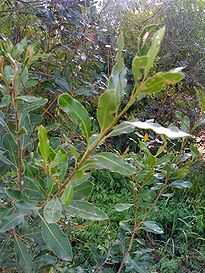Lithraea molleoides
| Lithraea molleoides | |
|---|---|
 | |
| Scientific classification | |
| Kingdom: | Plantae |
| (unranked): | Angiosperms |
| (unranked): | Eudicots |
| (unranked): | Rosids |
| Order: | Sapindales |
| Family: | Anacardiaceae |
| Genus: | Lithraea |
| Species: | L. molleoides |
| Binomial name | |
| Lithraea molleoides (Vell.) Engl. | |
Lithraea molleoides (syn. Lithraea molleoides var. lorentziana Lillo, Lithraea ternifolia, Schinus brasiliensis Marchand ex Cabrera, Schinus leucocarpus M., Schinus molleoides (Vell.) Engler, Lithraea aroeirinha Marchand ex Warm.[1]) is a tree (2.5 and 8 m tall) that is native to South America, specially in Argentina, Bolivia, and Cerrado vegetation of Brazil.
Landscaping
The plant is commonly considered as unsuitable to landscaping, as it is a poisonous plant: it produces volatile substances that propagate from touching the leaves, through contact with droplets, or through the tree's pollen. These substances are allergenic[2] and contact with them may produce general allergic sensitivity, skin disease, fever, and visual problems.[3] Planting this tree where it can be accessible to the general public is therefore strongly discouraged.
Popular custom
In Uruguay, folk tradition states that people are supposed to salute the tree by changing the time of the day. If somebody encounters the tree during the day, she is supposed to say "Good night, Mrs. Aruera". Similarly, if it is during the night, she should say "Good day, Mrs. Aruera".
See also
References
- ↑ Lithraea molleoides at Germplasm Resources Information Network
- ↑ Cf. Paulo Backes & Bruno Irgang, Mata Atlântica: as árvores e a paisagem, Porto Alegre, Paisagem do Sul, 2004, page 100
- ↑ Shimizu, Mario Tsunezi; Bueno, Leandro de Jesus Franco;Rodrigues, Rosa Fátima Oliveira; Sallowicz, Fabiano Augusto; Sawaya, Alexandra Christine Helena Frankland; Marques, Márcia Ortiz Maio. Essential oil of Lithraea molleoides (Vell.): chemical composition and antimicrobial activity Brazilian Journal of Microbiology vol.37 no.4 São Paulo Oct./Dec. 2006
External links